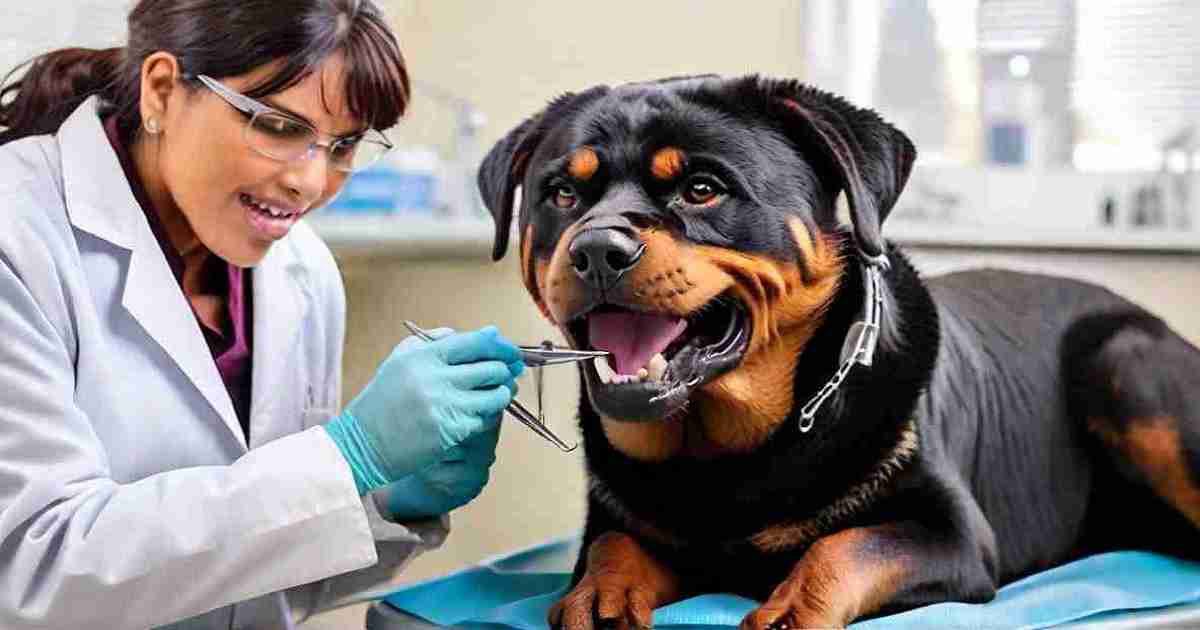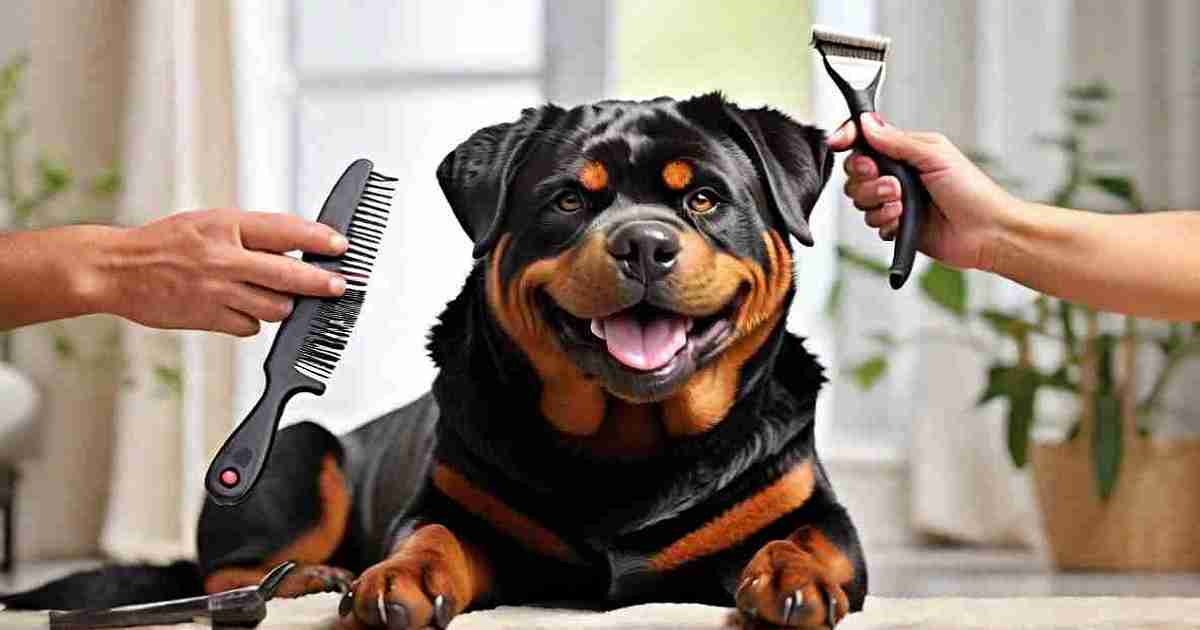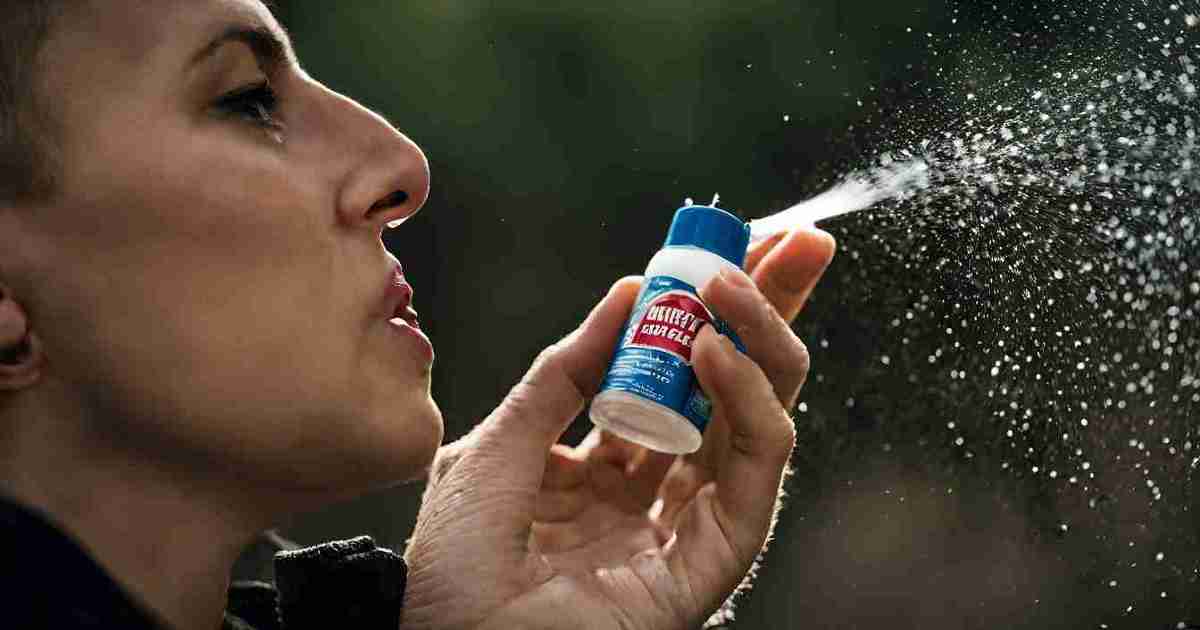Have you ever wondered why your Rottweiler licks you, themselves, or everything in sight so much? I know I sure was puzzled and frankly, a bit annoyed by this odd licking habit when I first got my Rottie.
As it turns out, there are a variety of reasons behind a Rottweiler’s tendency to lick excessively. It stems from a mix of natural doggie instincts, breed-specific traits, and individual factors unique to the pup.
Getting to the bottom of what drives a Rottweiler to lick requires digging into their temperament, pack mentality, possible medical causes, and more.
In this comprehensive guide, we’ll explore what’s really behind a Rottweiler’s obsessive licking behavior. You’ll get the scoop on:
- Where Rottweilers originated and how they were bred
- The typical Rottie personality – both good and bad traits
- Why licking is important for dog communication
- What’s “normal” licking vs excessive, obsessive licking
- Health conditions that could make them lick constantly
- Behavioral reasons like anxiety, boredom, stress, or begging for attention
- How being pack animals affects their licking habits
- Tips to train them to curb obsessive licking
- Optimizing their environment to prevent excessive licking
- The role of diet and nutrition when it comes to licking
- Real owners’ stories plus expert input on managing Rottweiler licking
By the end, you’ll really understand why your Rottweiler licks you and everything so much. More importantly, you’ll learn practical solutions to control over-the-top licking behavior.
So let’s get to the bottom of the mysteries behind “Why do Rottweilers lick so much?”
Getting to Know the Rottweiler Breed
Rottweilers originated back in Roman times as rugged livestock herding dogs who also guarded the Roman legions. Here’s a brief background on these noble working canines:
- They’re thought to be descendants of the ancient Roman drover dogs used to herd cattle.
- In the 19th century, they were mainly in the German town of Rottweil to drive cattle to market.
- They’ve served as police dogs, guide dogs for the blind, search and rescue dogs, and more.
- Rottweilers grew popular as family pets and show dogs in the 20th century.
- Even today, Rottweilers maintain strong herding, guarding, and working instincts from their history.
Some key traits of this self-assured breed:
- They’re typically confident, courageous, and devoted to their owners.
- Rotties tend to be eager to please and very trainable when handled firmly but kindly.
- They can be aloof with strangers but are affectionate cuddlebugs with their families.
- Their protective nature makes them excellent watchdogs and guard dogs.
Does this help explain the Rottweiler licking phenomenon? Let’s explore further! The key is understanding what makes Rottweilers tick.
- They can be aloof with strangers but are affectionate cuddlebugs with their families.
- Their protective nature makes them excellent watchdogs and guard dogs.
Does this help explain the Rottweiler licking phenomenon? Let’s explore further! The key is understanding what makes Rottweilers tick.
- Black coat with brown/rust markings on face, chest, legs
- The intense expression conveys confidence and courage
- The lifespan of 8-11 years on average
Rottweiler temperament:
- Extroverted, self-assured, and fearless
- Loyal, affectionate, and why do rottweilers lick so much with owners
- Intelligence enables them to learn quickly
- Independent thinkers aim to please owners
- Good-natured goofballs around family
The unique bond between Rottweilers and their owners
The special relationship between a Rottweiler and its owner stems from:
- Strong drive to work cooperatively with humans
- An innate desire to please owners and follow commands
- Deep devotion and loyalty once bonded to the owner
- Protective instincts make them view the owner as a “pack”
- Sensitive to reproach; want to avoid displeasing owner
- Crave owner’s love, care, and why do rottweilers lick so much?
Rottweilers bond intensely with their special person while remaining aloof from others. This unique connection results in their tendency to heavily lick their beloved owners. More on this later!
Why Do Rottweilers Lick So Much
Licking is an innate behavior in all canines that stems from the following natural instincts:
- Grooming – Licking their own fur helps clean it and maintain hygiene. The moisture and motion help remove debris and straighten fur.
- Healing – Dog saliva contains enzymes and antibacterial properties that promote wound healing. Licking can help self-soothe cuts, sores, etc.
- Exploring – Licking allows dogs to sample scents and flavors in their environment. It provides sensory information about food, objects, and other animals.
- Cooling – Panting and licking help regulate a dog’s body temperature. The evaporation of saliva from licking cools the tissues.
- Calming – The motion of licking releases endorphins that have a calming effect on dogs. It can soothe anxiety or excitement.
- Pack bonding – The social licking of pack members strengthens relationships within canine groups. It reinforces connections.
So licking is deeply ingrained in a dog’s behavior for functional and social reasons. It’s completely natural dog behavior!
The various reasons why dogs lick people and objects
When directed at people or objects, dog licking often serves to:
- Greet owners, family, pack members
- Show affection – Licking feels good so they lick loved ones
- Taste food, scents, and items in the environment
- Self-soothe anxiety, excitement, or alone time
- Communicate – Send signals to humans or other dogs
- Get attention – Licking prompts petting, praise, play
- Display submission – Subordinates lick leaders in the pack
- Soothe skin irritation, rashes, and pain through healing enzymes
So licking fulfills many purposes for dogs depending on the context. It meets physical and emotional needs while conveying information.
How licking is a form of communication for dogs
For dogs, licking is a key form of non-verbal communication that:
- Conveys emotions – happiness, affection, stress
- Signals deference to authority figures
- Seeks attention or reassurance
- Shows caregiving towards puppies or packmates
- Strengthens social bonding within the pack
- Provides sensory information about their environment
Some specific “lick signals” include:
- A quick flick of the tongue – Greeting
- Sustained licking of hands/face – Showing affection
- Licking legs/paws – Seeking attention
- Licking air – Nervousness
- Licking genitals – Stress or anxiety
- Licking wounds – Attempting to heal packmate
So pay attention to the context of your dog’s licking to understand why do rottweilers lick so much behind the behavior. Licking communicates something!
Rottweilers’ Licking Behavior
It’s extremely common for Rottweilers to lick their owners, themselves, objects, and their environment – often to an excessive degree.
Some key facts about Rottweilers’ tendency to over-lick:
- Many owners remark their Rottie is a “licking machine”
- Excessive licking of owners’ hands, face, and feet is frequently reported
- Rottweilers will lick inanimate objects excessively too
- They’ve been known to lick carpets, furniture, and walls obsessively
- Some lick themselves compulsively, leading to sores or hair loss
So heavy licking beyond a normal amount is a very prevalent trait in this breed. But why? The root causes will be explored later in this guide.
Differentiate between normal licking and excessive licking
It’s important to distinguish normal licking behavior from excessive, obsessive licking in Rottweilers:
Normal licking
- Affectionate licks when greeting owners
- Licking hands or feet briefly during petting/bonding
- Self-grooming licks during bathing or rest periods
- Tasting food items or new environments occasionally
- Slight increase in licking during times of excitement or anxiety
Excessive licking
- Constant, obsessive, repetitive licking of people, objects, or themselves
- Licking to the point of irritation, hair loss, wounds on themselves or people
- Licking for prolonged periods, sometimes for hours
- Licking behaviors that seem uncontrollable
- Displacement licking of objects when bored, anxious, or understimulated
Use these indicators to determine if your Rottweiler’s licking behaviors are within normal ranges or considered excessive.
Interesting anecdotes of Rottweilers’ licking behavior
Here are some real-life examples highlighting the Rottweiler breed’s fixation with licking:
- Molly licks her owner Jeff’s face relentlessly as soon as he gets home from work every day. She once licked his entire face and ears for 30 minutes straight!
- Bruno loves licking their hands so much some family members have to hide their hands to pet him because the licking gets out of control.
- Mia obsessively licks the couch cushion in one spot for hours, leaving a large wet spot. She seems to do it most when left home alone.
- Rocky licks his paws constantly until they are stained brown. The vet ruled out allergies and the excessive licking seems behavioral.
- Leo will forcefully paw at your arm and start licking if you stop petting him. He seems to crave constant affection and why do rottweilers lick so much through licking?
As you can see, Rottweilers take licking to the extreme! Now let’s uncover the reasons behind this peculiar behavior.
Health and Medical Factors
Several potential medical issues could cause a Rottweiler to have an increased urge to lick themselves or objects excessively:
- Allergies – Food or environmental allergies can cause itchy skin that a Rottweiler licks for relief.
- Parasites – Fleas, ticks, or mites can lead to constant licking of affected areas.
- Infections – Bacterial, yeast, or fungal skin infections cause irritation and inflammation that may prompt licking at the site.
- Wounds/Injuries – Licking is a natural response to pain or irritation from wounds, sores, stitches, etc.
- Joint pain – Rottweilers prone to hip and elbow dysplasia may lick painful joints.
- Digestive issues – Some gastrointestinal issues may cause nausea or discomfort leading to excessive licking.
- Dental disease – Tooth decay, gum infection, or mouth pain can increase licking behaviors.
- Neurological disorders – Conditions impacting the nervous system like seizures may cause odd licking.
- Cancer – Licking could be a response to discomfort caused by tumors or cancerous growths.
So a wide range of medical problems can potentially contribute to a Rottweiler feeling compelled to lick excessively as a way to soothe pain or discomfort. Always have your veterinarian examine your dog to diagnose and treat any underlying conditions that could be causing an increase in licking behaviors.
Explain the role of allergies and skin conditions
Hypersensitive reactions and skin troubles are a number of the most common scientific triggers for excessive licking in Rottweilers. Here’s some history:
- Rottweilers often develop food allergies to ingredients like beef, dairy, chicken, wheat, and soy. An elimination diet trial is used to identify the allergen. This causes intense itchiness that leads to excessive licking of paws, legs, and belly.
- Environmental allergies to things like pollen, dust mites, and grass can also cause itchy, inflamed skin. Rottweilers lick constantly in an effort to soothe the irritation.
- Atopic dermatitis is a hereditary chronic skin condition common in Rottweilers where the skin overreacts to allergens. It results in red, flaky, itchy irritated skin that dogs lick obsessively.
- Yeast or bacterial infections on the skin, ears, paws, or anus from allergies can prompt licking at infected sites.
So determining if allergies or skin conditions are the root cause is important when evaluating a Rottweiler with constant licking issues. Appropriate treatment of the skin problem is key to resolving excessive licking behaviors.
Share insights on dental issues and oral hygiene
Poor dental health and oral discomfort are sometimes overlooked factors for increased licking in Rottweilers:
- Tooth infection – Periodontal disease is common in Rottweilers and tooth decay or abscessed teeth cause mouth pain that leads to licking behaviors.
- Gingivitis – Inflammation and bleeding of the gums from gingivitis makes the mouth feel uncomfortable, possibly triggering licking.
- Oral injury – Any oral wound, swelling, or foreign item stuck in the mouth causes pain and irritation that could prompt licking.
- Mouth cancer – Tumors in the mouth or on the tongue are very painful and may lead to obsessive licking.
Good preventative dental care through regular teeth brushing, yearly dental cleanings under anesthesia, dental sealants, and oral health monitoring helps reduce the likelihood of painful dental issues that contribute to excessive licking in Rottweilers.
Be sure to rule out any potential medical factors that could be the underlying cause for increased licking behaviors in your Rottweiler. Your vet can help diagnose and properly treat any conditions leading to their tendency to why do rottweilers lick so much?
Behavioral and Psychological Reasons
Licking behaviors can also stem from psychological factors like boredom, anxiety, or stress in Rottweilers.
- Boredom – Rottweilers are working dogs bred for demanding jobs. If understimulated, they easily become bored and resort to displacement behaviors like obsessive licking of themselves or objects. Intense mental and physical exercise is key.
- Anxiety – Rottweilers prone to general anxiety, separation anxiety, or phobias may excessively lick themselves or people as a self-soothing mechanism. The licking action releases calming endorphins.
- Stress – A change in environment or routine, a new family member, or construction sounds can cause stress that may prompt a Rottweiler to lick as a coping mechanism.
So psychological triggers can drive excessive licking, even in the absence of medical issues. Rottweilers lick as it calms and comforts them when emotions are unbalanced.
Discuss how stress and separation anxiety affect licking
Two common psychological issues – stress and separation anxiety – often manifest as excessive licking:
- Stress – Rottweilers may compulsively lick their owner, another dog, or themselves when stressed by loud noises, unfamiliar places or people, or changes in routine. Licking self-soothes their nervousness.
- Separation Anxiety – Being apart from their owners can cause severe distress in some Rottweilers, leading to behaviors like destruction, barking, pacing, and obsessive licking. Licking helps relieve their anxiety.
Rottweilers who display stress or separation anxiety may engage in displacement licking even without a medical cause because it calms their emotional turmoil. Identifying and addressing the root cause of their stress is key to curbing their need to why do rottweilers lick so much.
The connection between licking and seeking attention
Attention-seeking is another psychological motivator for excessive licking in Rottweilers.
- Rottweilers love interaction and affection from their owners. Some learn that constant licking elicits petting, cuddling, scolding – any reaction.
- Owners may inadvertently reinforce excessive licking by giving attention, even negative attention when the Rottweiler licks. This rewards the behavior.
- Licking becomes an attention-seeking device to engage their owner in interaction.
It’s important not to reward or respond to attention-seeking licking behaviors to avoid reinforcing the habit. Redirect the Rottweiler to an appropriate toy or activity instead.
So psychology and emotions play pivotal roles in driving Rottweilers to lick excessively. Addressing root causes like boredom, anxiety, and attention-seeking tendencies is needed to curb problematic licking.
Social and Pack Behavior
The Rottweiler breed’s inherently social nature influences their fixation with licking their owners, other dogs, and even themselves:
- Rottweilers crave constant companionship. Time alone is stressful for this velcro breed.
- They thrive on regular positive interaction and affection from their family. Licking elicits attention.
- Rottweilers are highly tactile dogs that enjoy physical touch like petting, hugging, and leaning. Licking satisfies this need.
- Their social orientation makes them attentive to cues from humans and canine packmates. Licking is used to communicate reciprocally.
So the Rottweiler’s deep social wiring sparks their impulse to lick frequently as a social tool to connect with others. Their gregarious nature drives their preoccupation with licking.
Discuss pack behavior and the role of licking in a pack
As pack animals, licking plays an integral role in communication within a Rottweiler’s social group:
- Licking reinforces the social hierarchy and cohesion in a dog pack. Lower members lick leaders.
- It signals deference and respect to dominant members of the pack.
- Reciprocal licking strengthens bonding between packmates.
- Licking puppies demonstrates caregiving and nurturing behaviors within the pack.
- Licking wounds and sores of other members exhibit caretaking and healing instincts.
So licking facilitates crucial social functions that maintain structure and relationships within the pack. Rottweilers are wired to lick extensively based on these pack dynamics.
The implications of hierarchy in licking within a Rottweiler pack
The hierarchies and roles within a Rottweiler pack influence licking patterns:
- The Rottweiler views its owner as the “leader of the pack” and licks them frequently to show loyalty, affection, and deference.
- Lower-ranking dogs in a multi-Rottweiler home lick higher-ranking members more readily.
- As natural protectors of the pack, male Rottweilers tend to lick more obsessively than females.
- An unneutered male Rottweiler displays the most persistent licking aimed at reinforcing his dominance.
So the pack mentality ingrained in Rottweilers contributes to obsessive licking aimed at signaling deference, caring, and protecting according to the dog’s role in the pack dynamic. Their social wiring drives the need to why do rottweilers lick so much.
Training and Modification
- Redirect licking by substituting a toy to lick when they try to lick you. Reward them for licking the toy instead.
- Give a “sit” or “down” command when licking gets out of control to disrupt the behavior. Reward them with treats when they comply.
- Limit attention and affection during excessive licking so as not to reinforce it. Withdraw your presence if licking persists.
- Apply a bitter anti-lick spray on your hands/skin to deter the rewarding taste of licking. Spray areas they lick to break the habit.
- Provide plenty of exercise, play, training, and puzzle toys to prevent boredom and calm anxiety that can cause obsessive licking behaviors. A tired Rottweiler licks less!
Discuss positive reinforcement training techniques
Positive reinforcement training is very effective for curbing problematic licking:
- Reward desired behaviors like sitting calmly, paying attention, playing with a toy with treats, praise, or affection. This reinforces what you want them to do instead of licking.
- Use clicker training to mark and reward the absence of licking. The click helps communicate the precise moment to reward.
- Ask for an incompatible behavior when licking starts like “get your toy.” Rewarding this redirects them to a more desirable behavior.
- Praise and treat for disengaging from licking on their own. This builds motivation to self-regulate the unwanted behavior.
Share professional guidance on behavior modification
For serious licking issues, consult professionals:
- Certified dog trainers can help implement customized training programs using desensitization, counterconditioning, and positive reinforcement to modify obsessive licking habits.
- A veterinary behaviorist can diagnose and treat any underlying medical or psychological conditions driving the extreme urge to why do rottweilers lick so much. Medications may help in some cases.
- A dog psychologist addresses problematic attention-seeking, anxiety, stress, or compulsive disorders that manifest in uncontrollable licking behaviors in Rottweilers.
So in addition to management at home, professional behavior modification guidance, training, and possible medications are sometimes needed to successfully treat excessive licking issues in Rottweilers.
Home Environment
The home environment can significantly influence Rottweiler’s behavior. Setting up their living space properly helps reduce stress and anxiety that can trigger obsessive licking habits.
Tips for a lick-free home:
- Provide adequate physical and mental exercise daily to prevent boredom. A tired Rottweiler licks less!
- Ensure access to fresh water, appealing toys, and designated sleeping and feeding areas.
- Minimize environmental stressors like loud noises, changes in routine, or strangers in the home.
- Maintain calm, consistent leadership and training to give the Rottweiler confidence and security.
Tips on managing stimuli that trigger excessive licking
Specific triggers in the environment often prompt excessive licking. Strategies to manage these include:
- Confine the Rottweiler in a quiet room if loud construction noise causes stress licking. Provide background white noise.
- If visitors cause anxiety leading to licking, confine the dog in another room and allow socialization at their pace.
- If being home alone sparks obsessive licking, provide stimulating puzzle toys during absences and hire a dog walker.
Creating a comfortable space for Rottweilers to reduce anxiety
Designating a proper living space tailored to a Rottweiler’s needs reduces environmental stress that can manifest as anxious licking:
- Provide an orthopedic bed in a low-traffic area for undisturbed rest. Place the bed on a mat or rug for traction.
- Maintain comfortable temperature and air circulation. Rottweilers are prone to heat stress.
- Supply puzzle feeders, food balls and chew toys to meet their needs for mental stimulation. Rotating toys prevents boredom.
- Play calming music like reggae or soft rock to minimize alarming sounds from the outside environment.
- Use an Adaptil pheromone diffuser or collar to promote relaxation in high-stress situations where licking is prevalent.
Modifying aspects of their living space to better suit a Rottweiler’s needs is an important step in curbing obsessive licking driven by environmental factors. A serene home environment reduces anxiety and stress that manifests in destructive Why do rottweilers lick so much?
Grooming and Hygiene
Consistent grooming is important for Rottweilers prone to problematic licking for several reasons:
- Removes dirt, debris, and loose hair that may get stuck on the tongue and prompts more licking to eliminate.
- Bathing and brushing minimize skin irritations, dry skin, or dermatitis that causes discomfort and itchiness leading to obsessive licking.
- Checking coat, skin, ears, and paws during grooming allows early detection of problems like rashes, infections, or parasites that could make them lick excessively.
- Regular nail trims curb damage caused by anxious diggers. Damaged nails are painful and prompt licking.
- Maintaining clean teeth and healthy gums reduces oral pain and discomfort that can lead to increased muzzle licking.
Offer grooming tips to reduce the likelihood of excessive licking
Recommended grooming guidelines:
- Brush coat 2-3 times a week to remove loose hairs and distribute skin oils.
- Give a bath every 2-4 weeks with appropriate Rottweiler shampoo. Bathing too frequently can dry out their skin.
- Inspect skin, ears, eyes, and paws at every bath time. Look for issues that could spark discomfort and licking.
- Brush teeth weekly with dog-safe toothpaste. Seek regular professional dental cleanings.
- Clip nails as needed, usually every 2-3 weeks for active Rottweilers. Avoid overgrown nails.
The role of cleanliness and skincare in minimizing licking
Proper cleanliness and skincare help deter excessive licking:
- Bathing removes allergens and dirt that may accumulate on the coat and skin prompting licking.
- Using dog-safe moisturizing shampoos and conditioners prevents dry, itchy skin that leads to licking.
- Rinsing feet after outdoor walks prevent debris buildup between paw pads that could get licked.
- Applying musher’s secret wax to paws protects against salt, chemical, or heat irritation that prompts licking.
- Cleaning face folds, skin wrinkles, and sanitary areas prevents yeast and bacteria overgrowth that results in infections and inflammation, triggering increased licking behaviors.
So a little bit of diligence on the grooming and cleanliness front helps prevent issues that compel Rottweilers to why do rottweilers lick so much. Give your Rottie a lick-free coat!
Dietary Considerations
A Rottweiler’s diet can impact excessive licking habits in a few ways:
- Allergies or sensitivities to certain foods or ingredients lead to itchy skin, ear issues, and gastrointestinal distress that results in increased licking behaviors.
- Lack of essential fatty acids causes dry, flaky skin and coat that feels uncomfortable and prompts licking in an effort to soothe irritation.
- Not getting enough protein can cause obsessive licking of surfaces to ingest nitrogen.
- Oral pain or issues caused by hard kibble or treats may lead to muzzle licking.
So nutritional deficiencies as well as food intolerances can contribute to skin, coat, oral or systemic health issues that compel Rottweilers to lick excessively.
Discuss food allergies and intolerances
Food allergies are common triggers for extreme licking:
- Rottweilers often develop allergies to ingredients like beef, chicken, wheat, soy, dairy, or eggs used in many commercial dog foods.
- Allergic reactions cause itchy skin, rashes, ear issues, and gastrointestinal upset leading to obsessive licking at irritated areas.
- Working with your vet to identify the problematic ingredients through elimination diet trials is key. Feeding foods free of allergens can stop the itching and licking.
Highlight the importance of consulting a veterinarian for dietary advice
It’s best to involve your vet for dietary changes:
- Have your vet run allergy tests to pinpoint problematic ingredients.
- Ask your vet first before arbitrarily switching foods or protein sources, which could worsen allergies.
- Consult your vet on adding nutritional supplements if your Rottweiler has deficiencies leading to excessive licking issues.
- Have your vet review your Rottweiler’s overall diet to ensure it provides balanced nutrition to support healthy skin, coat, teeth, and joints, which helps minimize the discomfort that compels them to Why do rottweilers lick so much?
Working closely with your veterinarian to tailor your Rottweiler’s diet to their unique nutritional needs and eliminate any food intolerances is key to reducing problematic licking linked to dietary factors.
Here is a section on frequently asked questions about excessive Rottweiler licking, using markdown formatting:
Frequently Asked Questions (FAQs)
What is the normal amount of licking for a Rottweiler?
- Occasional licks when greeting people or during petting sessions.
- Brief self-grooming licking during baths or rest periods.
- Slightly increased licking when excited or anxious.
- Licking for a few minutes at a time is generally normal.
How do I know if my Rottweiler’s licking is excessive?
- Licking people, objects, or themselves for prolonged periods of over 10-15 minutes at a time.
- Constant, repetitive licking that seems uncontrollable.
- Licking that leads to significant hair loss, wounds, or skin damage.
- Licking that occurs obsessively despite correction.
Can excessive licking be a sign of a serious health issue?
- Yes, it can indicate conditions like infections, allergies, dental disease, gastrointestinal issues, parasites, anxiety disorders, or other medical problems.
- It’s important to have your vet evaluate your Rottweiler if licking becomes excessive to diagnose and treat any underlying medical factors.
How can I address separation anxiety-related licking?
- Use calming aids like Adaptil diffusers and calming treats.
- Provide stimulating puzzle toys during absences.
- Start with brief absences and reward calm behavior upon return.
- Consider doggy daycare or a pet sitter during the day.
Are there specific training techniques for curbing licking?
- Use positive reinforcement to reward desired behaviors.
- Employ redirection by substituting toys when licking starts.
- Issue commands like “sit” or “down” to interrupt licking.
- Withdraw attention for excessive licking rather than rewarding it.
What grooming practices can help reduce licking?
- Regular bathing, brushing, and nail trims to prevent skin and nail issues.
- Inspecting for parasites, infections, and wounds during grooming.
- Brushing teeth, and cleaning wrinkles/folds to prevent discomfort.
- Keeping fur between toes trimmed to prevent debris buildup.
Should I change my Rottweiler diet to stop excessive licking?
- Consult your vet first. Elimination diet trials may be recommended to identify food allergies. Don’t arbitrarily change your diet without guidance.
- Adding fatty acids, vitamins, or protein supplements may help but ask your vet first.
When is it time to consult a veterinarian about licking?
- If licking becomes frequent or excessive despite your efforts to curb it.
- If licking results in wounds, significant hair loss, or skin damage.
- If licking is accompanied by other signs of illness like appetite changes or lethargy.
Don’t hesitate to ask your vet for help if your Rottweiler develops troublesome licking habits. Certain medical conditions can compel Rottweilers to Why do rottweilers lick so much? So it’s important to identify and treat any underlying factors contributing to excessive licking.
Case Studies
Real-life examples of Rottweilers with licking issues
- Dusty would lick his owner’s face excessively, even licking inside her nose and ears. This occurred every day when the owner came home from work, lasting up to 30 minutes nonstop.
- Bear compulsively licked and chewed at his own front legs until the fur was stained and the skin became irritated and raw.
- Millie obsessively licked at the air, often while staring at corners or shadows around the home. The random licking episodes lasted several minutes.
Strategies used to address the problems
For Dusty, the owner began keeping a bitter lemon spray by the door and sprayed it on her hands and face as soon as she arrived home before Dusty could lick her. She also redirected Dusty to lick a chew toy instead of her face. Within a few weeks, Dusty broke the obsessive face-licking habit.
For Bear, the owner took him to the vet, and allergy testing revealed he had severe environmental allergies to grasses. Bear was started on allergy immunotherapy and daily antihistamines. Together with bitter spray on his legs, Bear’s obsessive licking and chewing of his legs resolved.
In Millie’s case, anti-anxiety medication prescribed by a veterinary behaviorist helped reduce her obsessive shadow/air licking after determining it stemmed from severe separation anxiety. Millie also attended confidence-building obedience classes. Her random obsessive licking episodes greatly diminished with the combination approach.
Before-and-after insights on behavior modification
In all cases, the Rottweilers exhibited severe obsessive licking habits triggered by different root causes – excitement, allergies, and anxiety. However, through customized treatment plans tailored to address the underlying factor in each dog, their problematic licking behaviors were able to be successfully modified and overcome, improving the dogs’ quality of life. Their owners reported the training techniques, medical intervention, and behavior modification strategies resulted in significant reductions in their tendency to why do rottweilers lick so much.
These real-world case studies provide insight into how employing the right approach to identify and treat the reason for excessive licking can help rehabilitate Rottweilers suffering from obsessive licking disorders.
Here is a section interviewing experts about excessive Rottweiler licking issues, using markdown formatting:
Expert Insights
Interview with veterinary behaviorist Dr. Patel
Dr. Patel, why do Rottweilers seem prone to obsessive licking habits?
Rottweilers are large, high-energy working dogs bred for demanding jobs. If their needs aren’t adequately met, they easily become bored, anxious, or stressed. Excessive licking is often a displacement behavior that relieves these emotions. Their tendency to form intense bonds also motivates licking to show affection or get attention.
What medical issues may cause increased licking in the breed?
Allergies, skin infections, dental problems, and joint pain are common medical triggers. Obsessive licking can also indicate psychological disorders like anxiety, OCD or stress disorders. Thorough vet exams are needed to diagnose and treat the underlying condition.
When is medication warranted for obsessive licking?
If licking becomes excessive despite behavior modification, we may prescribe anti-anxiety medicines or natural supplements to help control the compulsive urges while also addressing the root cause through training, enrichment, and lifestyle adjustments.
Insights from certified dog trainer Riley
What training approaches work best for curbing excessive licking?
Positive reinforcement and redirection are very effective. Reward calm, settled behaviors, and redirect licking onto appropriate chew toys. Providing adequate physical and mental stimulation prevents boredom-based licking. Obedience training also builds confidence and strengthens the human-Rottweiler bond.
How can owners avoid reinforcing obsessive licking?
It’s instinct to want to comfort a licking dog but this rewards the behavior. Withdraw attention instead. Also, set up the environment to avoid triggers that spark anxious licking. Rottweilers thrive on routine and predictability.
When do you recommend involving a veterinary behaviorist?
If excessive licking persists despite training efforts, if it results in self-injury, or if it disrupts daily life, definitely seek help from a certified applied animal behaviorist. They can diagnose if a medical condition or psychological disorder is causing the obsessive behavior.
Key takeaways on curbing Rottweiler excessive licking:
- Identify and address underlying medical, behavioral, or environmental factors triggering the obsessive licking.
- Stick to positive training methods and never punish or scold obsessive licking.
- Ensure adequate physical and mental stimulation. A tired, happy Rottweiler licks less!
- Manage the environment to minimize stressors that can cause anxious, compulsive licking.
- Consult both your vet and a qualified behaviorist for customized treatment if excessive licking persists.
Expert input provides valuable guidance on effectively handling obsessive licking issues in Rottweilers through a combination of training, enrichment, medical treatment, and environment management tailored to the individual dog. With the right approach, this breed’s tendency for excessive Why do rottweilers lick so much? can be overcome.
Here is a section sharing success stories of Rottweilers overcoming excessive licking issues, using markdown formatting:
Success Stories
Rottweilers who overcame obsessive licking habits
- Rocky was licking his paws raw and bloody. After ruling out medical causes, his anxious licking was addressed through daily exercise, puzzle toys, and calming supplements. Rocky’s paws healed and the obsessive licking was resolved with the program.
- Mischief compulsively licked the air and carpets for hours, worsening when left alone. Anti-anxiety medication and crate training helped ease his separation stress and curbed the neurotic licking behaviors.
- Bear chewed his tail endlessly, leaving it bald and irritated. Allergy shots and a diet change to novel proteins finally stopped the itchy skin and tail chewing behavior.
Highlighting their transformation
In all these cases, distressed Rottweilers suffered from obsessive licking habits that negatively impacted their health and quality of life. However, through personalized treatment plans tailored to each dog’s unique issues, their excessive licking was successfully treated.
With the right approach of training, enrichment, medical intervention, and environment management, each Rottweiler was able to overcome their tendency for destructive repeated licking. Their rehabilitation stories showcase that curbing obsessive licking is possible!
Happy owner testimonials
“I can’t believe Rocky’s constant paw licking stopped thanks to the changes we made. It’s like I have a new dog. No more bloody paws!” – Rocky’s owner
“Mischief is so much more relaxed since we treated his separation anxiety. The obsessive licking has stopped. I’m grateful we could help him.” – Mischief’s owner
“I’m so relieved Bear’s tail chewing is under control now that we identified his allergies. He’s a much happier boy.” – Bear’s owner
These real-life success stories demonstrate that with persistence and the right customized treatment plan, Rottweilers can overcome tendencies for excessive why do rottweilers lick so much? Improving their quality of life is so rewarding.
Conclusion
- Rottweiler excessive licking is very common, but there are ways to curb this behavior.
- Identifying the underlying cause – medical, behavioral, or environmental – is the first step.
- Medical issues, allergies, anxiety, stress, or attention-seeking could be motivators.
- Positive reinforcement training and enrichment are highly effective tools.
- Patience, consistency, and customized treatment tailored to the individual dog is key.
Rottweilers are genetically prone to licking frequently. While often well-intentioned, this obsessive behavior can become destructive and unhealthy.
As a committed Rottweiler owner, take the time to understand the nuances of your dog’s licking habits. Seek solutions through training, lifestyle adjustments, and medical treatment if their tendency to Why do rottweilers lick so much? becomes problematic. Addressing excessive licking improves a Rottweiler’s well-being and enhances your bond.
In case your Rottweiler struggles with obsessive licking problems, do not hesitate to try to find professional help.
Paintings closely together with your veterinarian, a certified dog teacher, and a veterinary behaviorist to get to the lowest of the behavior and lay out a powerful remedy plan. Your canine’s pleasant existence relies upon it.
Please share your experiences and success stories to help other owners handle Rottweiler’s excessive licking challenges. Together we can help this wonderful breed live their healthiest, happiest lives.
















3 thoughts on “How To Understand Why Do Rottweilers Lick So Much”